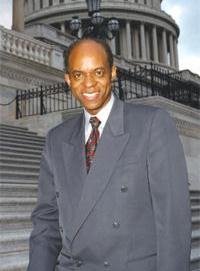
Net zoals in de Hirsi Magan affaire het hele Nederlandse parlement voor een collega opkwam, terwijl alle anderen die in een soortgelijke situatie verkeerden genegeerd werden, zo maakt het Amerikaanse Congres zich ineens druk over het schenden van het recht van een politicus die door de FBI werd betrapt, terwijl het Congres niet onmiddellijk in het geweer kwam tegen het illegaal bespioneren van gewone Amerikaanse burgers. De New York Times schrijft nu verontwaardigt: 'One Man's Constitutional Crisis ... The New York Times Editorial.
Republicans and Democrats in the House of Representatives have achieved an almost unprecedented level of bipartisanship in denouncing the FBI's search of a congressman's office. They talk angrily about the separation of powers and the implications of having an executive branch agency make a foray into a lawmaker's official space. Our first question is where all these concerned constitutionalists have been for the last five years.
Time and time again, Congress has played dead when the executive branch refused to provide it with information, answer questions or follow laws that the legislative branch has passed. Currently, the Senate Judiciary Committee, which has not been the worst offender, is tinkering dangerously with the laws covering domestic wiretapping by the National Security Agency. It could end up endorsing a program that the White House won't even fully describe to a vast majority of lawmakers.
Compared with the enormous issues at hand, the matter of Representative William Jefferson is small potatoes. The FBI says that it videotaped the congressman accepting $100,000 to grease the way for some business deals in Africa, and that agents found most of the money in his freezer. The Justice Department obtained a warrant, entered Mr. Jefferson's office and removed files that it says are related to that investigation.
Mr. Jefferson says there are two sides to every story, although he has not yet offered his. That does not make him guilty - indeed, he is yet to be charged. The House leaders demanded that the seized documents be returned, and the White House ordered them sealed for 45 days to buy time.
The FBI is going to have to show some very good reasons for having precipitated this showdown. Federal investigators have managed to prosecute many other officials for corruption over the last 200-odd years without ever barging into Congressional offices in the process. The danger of abuse with this kind of activity is enormous, especially with a president and an attorney general whose grasp for power seems to have no limits. They cannot be trusted to keep legitimate police activity from turning into political persecution. Just yesterday, administration officials were talking about having the FBI interrogate lawmakers in an attempt to find the sources of the Times article disclosing Mr. Bush's domestic spying operation. That would certainly represent a major breach of the separation of powers principle.
The constitutional claims made by the Congressional leadership on the Jefferson case seem overblown. House and Senate members are protected from arrest while going about their official business to shield them from intimidation and meddling by the executive branch in the affairs of state, not to deter law enforcement officials from doing their lawful duty to investigate possible felonies.
But members of Congress who have been politically comatose or complicit as the Bush administration built itself an imperial presidency, immune from the historical powers of the legislative branch, are up in arms. The House Judiciary Committee, which has been in the forefront of the long-running cave-in, has scheduled a hearing that the chairman has titled "Reckless Justice: Did the Saturday Night Raid of Congress Trample the Constitution?"
It seems like a phony approach to a real problem.' Zie:
http://www.nytimes.com/2006/05/26/opinion/26fri1.html?_r=1&oref=slogin Of:
http://www.truthout.org/docs_2006/052706Z.shtml Tot nu toe is het de New York Times in zijn berichtgeving over de Hirsi Magan affaire ontgaan dat ook hier sprake is van het meten met twee maten. Als een gewone asielzoeker niet mag liegen, mag ook een volksvertegenwoordiger dat niet. Dat ook in Nederland iedereen gelijk is voor de wet, begrijpt de New York Times kennelijk nog niet. Ook nogal wat journalisten van de commerciele massamedia meten met twee maten.



Geen opmerkingen:
Een reactie posten